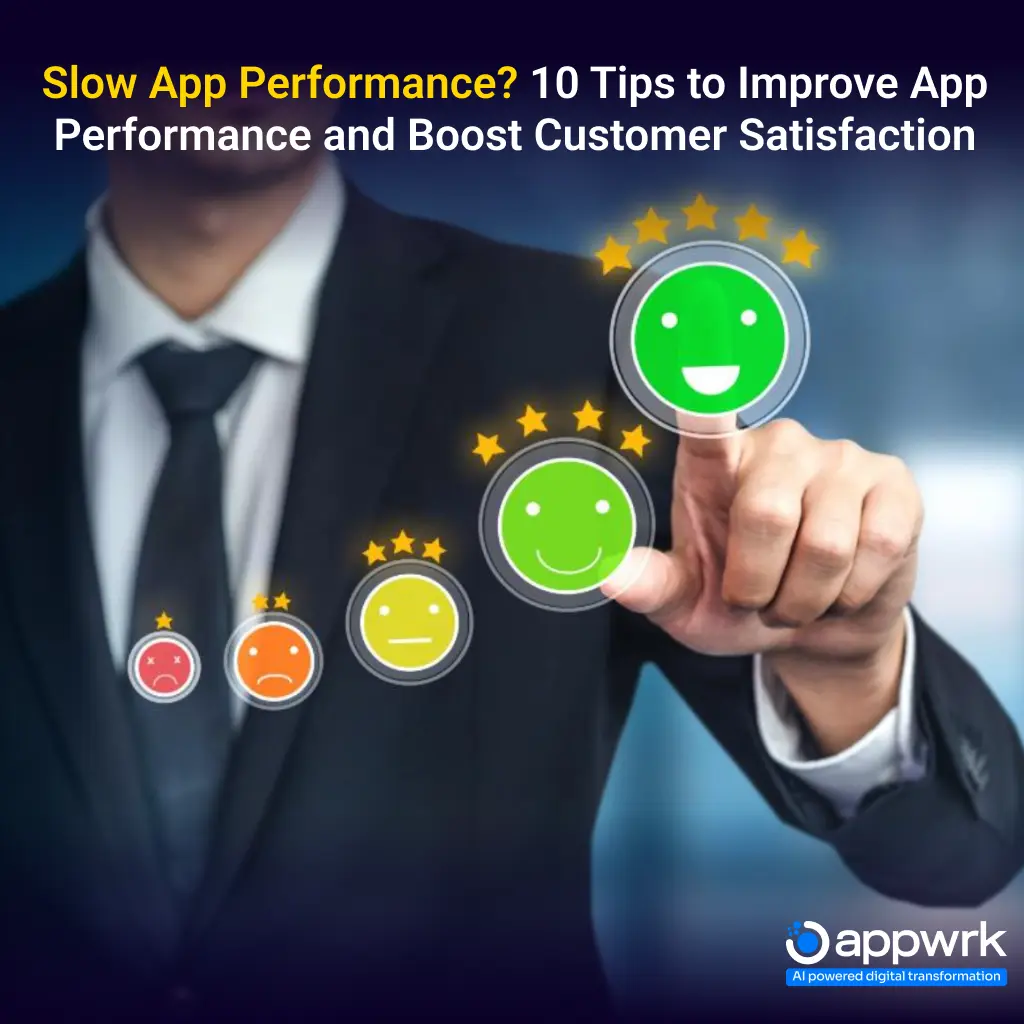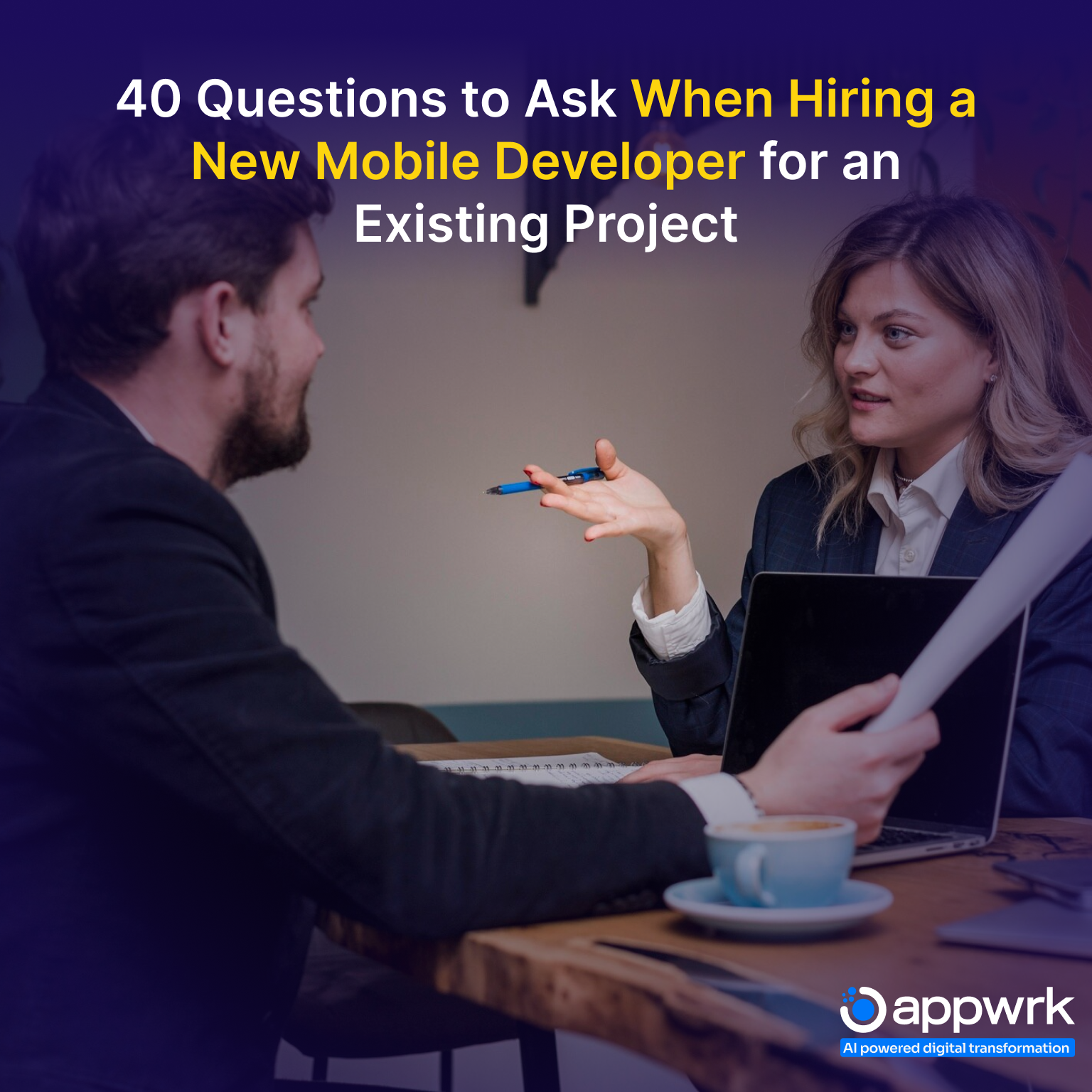20 Strategies to Enhance Mobile App User Engagement & Improve Retention
Introduction
Is your app struggling to connect with your target audience and retain users? Are you having a hard time driving more active users to interact with your app? In today’s digital age, where attention spans are shorter due to the constant flow of content, engaging app users requires more than introducing random features and demands a well-crafted engagement strategy that offers a captivating, personalized experience so that users keep coming back for more.
According to a recent study, a proper mobile app engagement strategy can help you increase conversion rates of up to 41%. Not only can a robust strategy help in generating positive impact, it can also help in shaping and ensuring the long-term success of your app. Most business owners get confused when it comes to increasing mobile app engagement and ask themselves, “Why isn’t my app engaging users? Whether you want to fully harness the potential of app engagement or retain your users, you must implement carefully crafted strategies to deliver meaningful results and scale the growth of your app.
Let’s find out the proven strategies to boost your mobile app engagement so that your app becomes a sustainable and future-proof success.
Table of contents
- Introduction
- What is Mobile App Engagement?
- Why is Increasing App Engagement Important?
- 20 Mobile App Engagement Strategies to Drive Growth
- How to Increase Mobile App Engagement
- 1. Simplify Onboarding Process
- 2. Personalize Sign-up Procedure
- 3. Share a Compelling App Story, Vision, and Mission
- 4. Keep it Simple
- 5. Encourage Feature Usage
- 6. Use Push Notifications Strategically
- 7. Add Relevant Social Components
- 8. Personalize App Experience
- 9. Enable App Gamification
- 10. Rekindle Users with Emails
- 11. Provide In-app Support
- 12. Focus on Omnichannel Marketing
- 13. Showcase Your Value Proposition
- 14. Build a Strong In-app Community
- 15. Offer Mobile Exclusive Rewards
- 16. Have a Clear Re-engagement Strategy
- 17. Leverage the “Network Effect”
- 18. Provide a Preview of the App’s UI
- 19. Stay Open to Experimenting
- 20. Update and Optimize Your App Regularly
- How to Develop a Mobile App Engagement Strategy?
- Different Metrics to Measure Mobile App User Engagement
- Summary – Mobile App Engagement Strategy
- Increase Your Mobile App Engagement with APPWRK
What is Mobile App Engagement?
The interaction that a user has with a mobile application once installing it is referred to as mobile app engagement and it is used to measure various things like how often users open the app, how long they stay, and how actively they engage with its features.
Mobile app engagement is calculated in two ways, namely Daily Active Users (DAU) or Monthly Active Users (MAU) based on different metrics like the frequency of each session and the in-app actions taken by the users. The engagement level of an app is also helpful in revealing how well the app retains its users and propels them towards a desirable conversion.
A strong user engagement not only proposes a wealth of benefits for mobile applications like improved retention rates and higher lifetime value but also provides a better experience to the users. Let’s look into more on the advantages of app engagement and why investing in it is important for applications to thrive in today’s market below.
Did You Know?
Why is Increasing App Engagement Important?
The more users engage with your application, the more content they will consume and the more likely they are to convert. In addition to higher conversion rates, increasing app engagement also directly influences user retention and reduces the risk of uninstalls and churn. In fact, 90% of the users who engage with an app tend to continue using it without abandoning it.
A higher engagement means that your users are consistently finding value in your app and indicates that they will be loyal to your brand and also recommend your app to others, leading to an increased customer lifetime value. Here is a graph that shows how app engagement strategies increase conversion rates in applications:

With users engaging with your app for a long time, you can gather valuable data about their behavior and fine-tune the experience of your app according to the likes of your audience. In fact, 73% users say that consumer experience plays a major role in increasing customer engagement and purchasing decisions, making it extremely important for businesses to use customer data that comes from app engagement to their benefit.
20 Mobile App Engagement Strategies to Drive Growth
- Simplify Onboarding Process
- Personalize Sign-up Procedure
- Share a Compelling App Story, Vision and Mission
- Provide a Preview of the App’s UI
- Keep it Simple
- Encourage Feature Usage
- Use Push Notifications Strategically
- Add Relevant Social Components
- Personalize App Experience
- Enable App Gamification
- Rekindle Users with Emails
- Provide In-app Support
- Focus on Omnichannel Marketing
- Showcase Your Value Proposition
- Build a Strong In-app Community
- Offer Mobile Exclusive Rewards
- Have a Clear Re-engagement Strategy
- Leverage the “Network Effect”
- Stay Open to Experimenting
- Update and Optimize Your App Regularly
How to Increase Mobile App Engagement
With consumers increasingly looking for highly engaging features and personalized experiences, it has become more evident than ever that mobile app engagement is no longer an afterthought. However, to fully reap the benefits from mobile app engagement, you need to carefully devise and implement the app engagement strategies that align with your application. Here are 20 proven strategies that you cannot miss out on if you want to ensure a long term success for your application.
1. Simplify Onboarding Process
It goes without saying that a smooth and straightforward onboarding process is essential to make users feel comfortable and confident about using your app from the start. Besides, if your users experience a glitch or have to go through a lengthy onboarding process, it might cause a huge drop in the user engagement leading to discontinued app usage. In fact, a great onboarding process has a 50% higher user engagement and retention rate when compared to one that has too many unnecessary steps.
2. Personalize Sign-up Procedure
Let’s face it, the onboarding process of your application makes the first impression to your audience and it can make or break the success of your application. By personalizing the sign-up process by asking for only essential information and offering customization options, you can make users feel valued and more connected to the app, boosting their mobile app engagement right from the beginning.
3. Share a Compelling App Story, Vision, and Mission
Did you know that 70% of the consumers who are emotionally connected to a brand will engage with it regularly and spend up to two times or even more? This shows that by creating an emotional connection with the audience through sharing the story behind your app, its vision and mission helps them go beyond simply understanding the functionality of the app but the purpose behind it, making way for a higher engagement rate.
4. Keep it Simple
With complicated apps being one of the top reasons for users uninstalling and abandoning an app, it is extremely important to keep things simple. Do not overwhelm things for your users with too many features or difficult navigation so that you can encourage users to return and engage with your application more frequently.
5. Encourage Feature Usage
Your users may not explore all the key features of your app and many highly engaging features can stay undiscovered without you guiding them towards it. Through tooltips, tutorials, or reminders, you can help users discover the new features of your app, increasing their engagement across various aspects of your application.

6. Use Push Notifications Strategically
Push notifications have become undoubtedly one of the smartest ways to drive user engagement and constantly drive them back to the app. In fact, according to Business of Apps, push notifications can increase reaction rates by 400% when used sparingly and with highly personalized content.
7. Add Relevant Social Components
Integrating social sharing features or community aspects to your application has become out of the question in recent times. With highly engaging features like in-app chat, you can bring together all the users of your application to a commonplace to interact and share their experiences and foster a space where they feel a sense of belonging.
8. Personalize App Experience
Offering a tailored experience based on the preferences of your users and their behavior within your application increases relevance and encourages them to return to your app regularly for a more customized interaction. According to a survey by Statista, around 56% of consumers are more likely to repeat purchases after a personalized app experience, making this a mandatory feature if you are looking to increase user engagement and conversion.
Also Read: 10 App Personalization Tips to Increase Customer Engagement in 2025
9. Enable App Gamification
To thrive and stand out in the crowded app industry, you need to give an experience to your users that engages them in an unforgettable way. In fact, recent studies reveal that app gamification can boost customer mobile application engagement by 48% with more than 70% of top companies already adopting it in their applications. By enabling gamification features such as points, challenges, and rewards, you can motivate users to engage more actively with the app and retain them for a long time.
10. Rekindle Users with Emails
Sending personalized email campaigns, such as reminders, updates, or exclusive offers, helps re-engage users who have not interacted with the app in a while and draw them back into the experience. This mobile engagement strategy is also important for increasing app engagement with users who have disabled their app notifications and can directly connect with them, keeping them in the loop about exciting updates on your app.
11. Provide In-app Support
Apps that offer seamless in-app support, whether through FAQs, live chat, or troubleshooting can see almost a double in their user engagement rate. In-app support allows users to solve problems quickly, making their experience smoother, leading to continued use, increased retention and higher conversion.
12. Focus on Omnichannel Marketing
Omnichannel marketing refers to engaging with your users across the channels that they prefer. To effectively implement this strategy and increase mobile app engagement, you need to first identify the preferred channels of your users by closely studying their behavior and deliver a consistent experience on all their touchpoints.
13. Showcase Your Value Proposition
Clearly displaying the value proposition of your application, what it offers the users and how it serves its purpose can help the users understand the true worth of your app. In fact, showcasing your value proposition is a clever marketing strategy that can hook the audience and give them a solid reason to engage with your application.
14. Build a Strong In-app Community
A solid in-app community encourages users to interact with each other within the app and can foster a strong sense of community. This sense of connection can boost app engagement by 35%, as users begin to engage with the app not only for its functionality but also for the relationships they form with other members and their attachment to the app itself.
15. Offer Mobile Exclusive Rewards
Rewarding the loyal users of your app by providing rewards or incentives that are exclusive to them will make these users feel appreciated and give them an added reason to stay active within the app, significantly increasing mobile app engagement. These rewards can be promoted on social media to draw users from those platforms back to the application.
16. Have a Clear Re-engagement Strategy
While it is important to have a proper user acquisition plan, focusing on retaining existing users is equally crucial. Developing and implementing an app engagement strategy for targeting existing users with techniques like personalized messages, offers, or updates can fetch you around 37% more revenue than only looking into organic user acquisition.
17. Leverage the “Network Effect”
The “network effect” is one of the fastest ways to increase mobile app engagement and promote mobile apps. By encouraging users to invite friends, share content, or collaborate within the app, you can create a network effect where more users will start engaging with the app, leading to increased value for everyone involved.
18. Provide a Preview of the App’s UI
Offering a sneak peek of your app’s user interface before they sign up or start using it can spark curiosity and excitement. Not only will it allow users to know what they will be greeted with but also make them more willing to explore the app further. For example, Zoom displays screenshots of its easy to use interface so that people feel more confident on using and navigating the app.
Also Read: Ultimate Guide to Mobile App Design: 20 Best UI Principles & Practices
19. Stay Open to Experimenting
Regularly testing and experimenting with new features, design changes, and engagement tactics helps you discover what resonates best with your users and keep the app fresh and exciting. Whenever you are rolling out a fresh update, monitor closely on how users receive it and make a data-driven decision if it should be a part of your app to increase mobile app engagement.
20. Update and Optimize Your App Regularly
Continuously update and optimize your app based on user feedback and performance analytics. This not only shows users that you are committed to improving their experience but also satisfies their need which encourages them to stay engaged and return frequently to your application.
Also Read: Mobile App Update Strategies: Why and How Often Should an App Be Updated?
Too Long; Didn't Read
- Make the user onboarding process smooth to reduce drop-offs.
- Customize the sign-up process to make users feel valued.
- Create an emotional connection with users by sharing your app's vision.
- Avoid complexity in features and navigation to encourage return visits.
- Guide users to discover new features through tooltips and tutorials.
- Use personalized push notifications to drive engagement.
- Implement social sharing and in-app community elements to foster interaction.
- Tailor the app experience to user preferences for better engagement.
- Incorporate points, challenges, and rewards to motivate users.
- Use personalized emails to bring inactive users back to the app.
- Offer seamless support to resolve issues and improve retention.
- Engage users across their preferred channels to maintain consistent interaction.
- Make it clear how your app benefits users to boost engagement.
- Encourage interaction among users, enhancing their sense of belonging.
- Reward loyal users with exclusive perks to keep them engaged.
- Focus on retaining users with personalized offers and updates.
- Encourage users to invite others to increase app engagement.
- Offer a sneak peek of your app's interface to increase curiosity and usage.
- Test new features and designs to keep the app fresh and engaging.
- Keep your app updated based on user feedback and performance insights to maintain engagement.
How to Develop a Mobile App Engagement Strategy?
A strong mobile app engagement strategy is the backbone of ensuring long-term engagement for your application. Without a clear plan, you risk going off track, wasting resources, and losing focus, ultimately leading to a disjointed user experience. Here are some of the key points for developing a successful app engagement strategy:
- Create a Comprehensive Action Plan: Base your strategy on customer needs, direct feedback, and user data to ensure it aligns with your audience.
- Holistic Approach: A well-rounded approach guarantees a streamlined process that offers a seamless user experience.
- Regular Analysis and Refinement: Continuously review and adjust your strategy before and after monetization to ensure effectiveness.
- Focus on Retention: Retaining and engaging existing users is just as important as acquiring new ones, keeping your app relevant and valuable.
Best Practices for Mobile App Engagement – Infographic

Different Metrics to Measure Mobile App User Engagement
Measuring the effectiveness of your mobile app engagement strategy is crucial to understanding its impact and making informed decisions to improve user engagement. Without properly measuring your mobile app user engagement, you might end up investing resources into strategies that may not be yielding the desired results. Here are the different key metrics you can use to evaluate your app’s engagement accurately:
- Daily Active Users (DAU) and Monthly Active Users (MAU) help you assess how often users are interacting with your app.
- Session Length reveals how engaged users are during each visit, while Retention Rate and Churn Rate indicate how well you’re retaining users and how many are leaving over time.
- User Lifetime Value (LTV) measures the total revenue each user generates, giving a long-term perspective on engagement.
- Additionally, tracking In-App Actions like clicks, shares, or purchases allows you to better understand user behavior.
Summary – Mobile App Engagement Strategy
As the mobile app market continues to evolve, more and more businesses have started to focus on prioritizing mobile app engagement to captivate users and stand out from the rest of the crowd. With a well-executed mobile app engagement strategy that understands your users and delivers value to them, you can create a profound impact on your business by witnessing significant improvements in retention rates, conversions and revenue growth.
Increase Your Mobile App Engagement with APPWRK

Looking to create a highly engaging app that propels your business forward? At APPWRK IT Solutions, a leading app development and AI-driven digital transformation company, we specialize in utilizing innovative strategies to build captivating apps that stand out and attract users. Our expert team of developers, with extensive experience across various industries, is dedicated to transforming your testing processes and enhancing software quality. Contact us today to revolutionize your digital presence and take your business to the next level!
Frequently Asked Questions (FAQs)
Q: What is a good engagement rate for an app?
A: While the good engagement rate for an app typically varies depending on the industry and the type of app, an engagement rate between 15% to 25% is considered strong. For mobile apps, this means that around 15% to 25% of your users are actively engaging with the app on a regular basis. However, the benchmark can fluctuate as social apps or gaming apps may see higher engagement rates, while utility or business apps may fall on the lower end.
Q: How to encourage users to use apps?
A: To encourage users to use your app, focus on creating an experience that resonates with their needs and building a strong connection through meaningful interactions. Consistently provide relevant updates based on data-driven analytics to keep them engaged over a long time. By doing so, users will be more likely to return frequently to your app and make it a part of their routine.
Q: How to get users engaged?
A: To get users engaged, focus on delivering meaningful app experiences that serve a significant purpose. When users feel that the app aligns with their values or goals, they are more likely to engage with it regularly. In addition to that, by creating a sense of belonging and making users feel heard and valued, you can foster deeper engagement over time.
Q: Which mobile metrics are used to evaluate app engagement?
A: In addition to the commonly used metrics, other mobile app engagement metrics that are used to evaluate app engagement are Screen Flow, which tracks how users navigate through the app, App Launches, which measures how often users open the app, Active Sessions, which tracks the frequency of user interactions, Push Notification Open Rate, which gauges how effective notifications are in engaging users and Feature Usage Rate shows which app features are most engaging.
Q: How people discover use and stay engaged with apps?
A: People discover, use, and stay engaged with apps through a combination of effective marketing, user experience, and ongoing value. Discovery often happens via app stores, word-of-mouth, social media, or targeted ads. Once they start using the app, a seamless, intuitive interface and features that align with their needs and preferences keep them coming back. To stay engaged, apps often provide personalized experiences, meaningful updates, and incentives like rewards or gamification and encourage users to remain active and loyal over time.
Q: Is increase user engagement and stickiness considered retention or growth?
A: Increasing user engagement and stickiness is closely linked to both retention and growth, though it leans more toward retention. Retention refers to the ability to keep users coming back to your app over time, and fostering engagement and stickiness plays a pivotal role in achieving this.
When users are highly engaged and find the app valuable, they are more likely to return consistently. However, engagement can also contribute to growth, as satisfied, engaged users are likely to recommend the app to others or share it on social media, leading to new user acquisition.
Q: What can you do to get engagement on a page?
A: To boost engagement on a page, you can implement several strategies. Start by creating compelling and relevant content that resonates with your target audience. Ensure the design is visually appealing, easy to navigate, and mobile-friendly. Add interactive elements like polls, quizzes, or comment sections to encourage participation. Optimize for quick load times to keep users from bouncing. Use clear, actionable calls to action (CTAs) to guide users toward desired actions, such as signing up or making a purchase. Additionally, integrate social sharing options to allow users to share content with their network, further increasing engagement.
About The Author






 Free Quote
Free Quote
















































